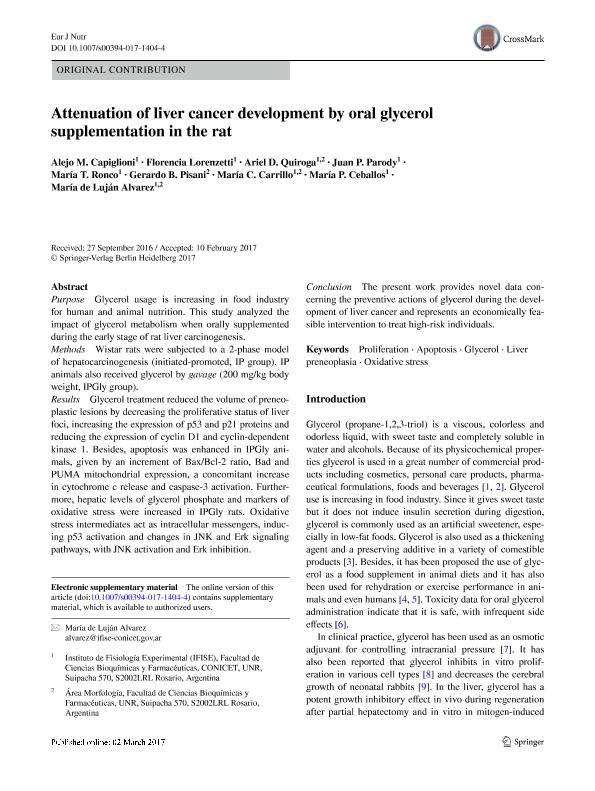Artículo
Attenuation of liver cancer development by oral glycerol supplementation in the rat
Capiglioni, Alejo Matías ; Lorenzetti, Florencia
; Lorenzetti, Florencia ; Quiroga, Ariel Dario
; Quiroga, Ariel Dario ; Parody, Juan Pablo
; Parody, Juan Pablo ; Ronco, Maria Teresa
; Ronco, Maria Teresa ; Pisani, Gerardo B.; Carrillo, Maria Cristina
; Pisani, Gerardo B.; Carrillo, Maria Cristina ; Ceballos Mancini, María Paula
; Ceballos Mancini, María Paula ; Alvarez, María de Luján
; Alvarez, María de Luján
 ; Lorenzetti, Florencia
; Lorenzetti, Florencia ; Quiroga, Ariel Dario
; Quiroga, Ariel Dario ; Parody, Juan Pablo
; Parody, Juan Pablo ; Ronco, Maria Teresa
; Ronco, Maria Teresa ; Pisani, Gerardo B.; Carrillo, Maria Cristina
; Pisani, Gerardo B.; Carrillo, Maria Cristina ; Ceballos Mancini, María Paula
; Ceballos Mancini, María Paula ; Alvarez, María de Luján
; Alvarez, María de Luján
Fecha de publicación:
04/2018
Editorial:
Dr Dietrich Steinkopff Verlag
Revista:
European Journal of Nutrition
ISSN:
1436-6207
Idioma:
Inglés
Tipo de recurso:
Artículo publicado
Clasificación temática:
Resumen
PURPOSE: Glycerol usage is increasing in food industry for human and animal nutrition. This study analyzed the impact of glycerol metabolism when orally supplemented during the early stage of rat liver carcinogenesis.
METHODS: Wistar rats were subjected to a 2-phase model of hepatocarcinogenesis (initiated-promoted, IP group). IP animals also received glycerol by gavage (200 mg/kg body weight, IPGly group).
RESULTS: Glycerol treatment reduced the volume of preneoplastic lesions by decreasing the proliferative status of liver foci, increasing the expression of p53 and p21 proteins and reducing the expression of cyclin D1 and cyclin-dependent kinase 1. Besides, apoptosis was enhanced in IPGly animals, given by an increment of Bax/Bcl-2 ratio, Bad and PUMA mitochondrial expression, a concomitant increase in cytochrome c release and caspase-3 activation. Furthermore, hepatic levels of glycerol phosphate and markers of oxidative stress were increased in IPGly rats. Oxidative stress intermediates act as intracellular messengers, inducing p53 activation and changes in JNK and Erk signaling pathways, with JNK activation and Erk inhibition.
CONCLUSION: The present work provides novel data concerning the preventive actions of glycerol during the development of liver cancer and represents an economically feasible intervention to treat high-risk individuals.
Palabras clave:
Apoptosis
,
Glycerol
,
Liver Preneoplasia
,
Oxidative Stress
,
Proliferation
Archivos asociados
Licencia
Identificadores
Colecciones
Articulos(IFISE)
Articulos de INST.DE FISIOLOGIA EXPERIMENTAL (I)
Articulos de INST.DE FISIOLOGIA EXPERIMENTAL (I)
Citación
Capiglioni, Alejo Matías; Lorenzetti, Florencia; Quiroga, Ariel Dario; Parody, Juan Pablo; Ronco, Maria Teresa; et al.; Attenuation of liver cancer development by oral glycerol supplementation in the rat; Dr Dietrich Steinkopff Verlag; European Journal of Nutrition; 57; 3; 4-2018; 1215-1224
Compartir
Altmétricas



